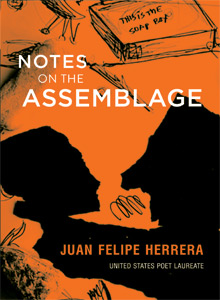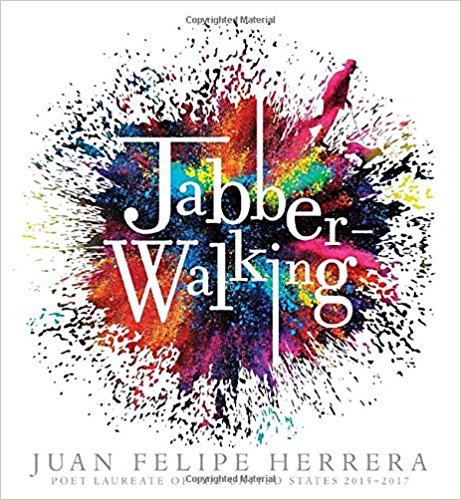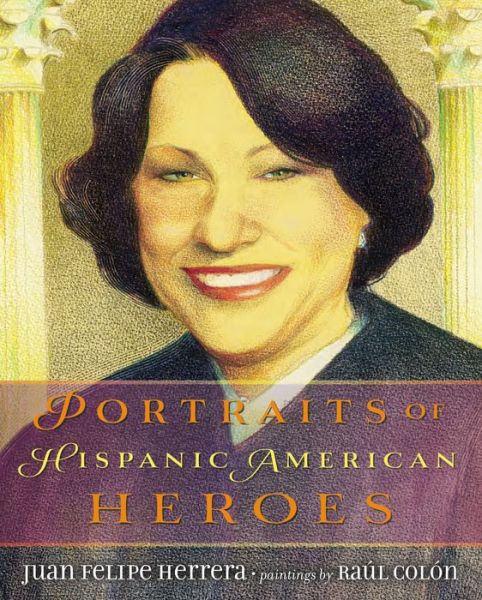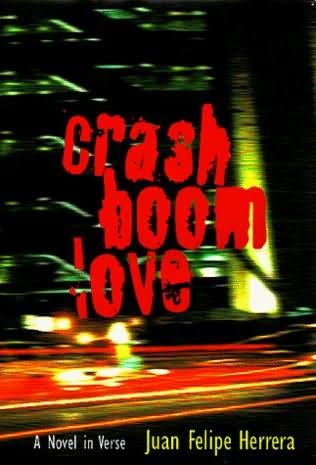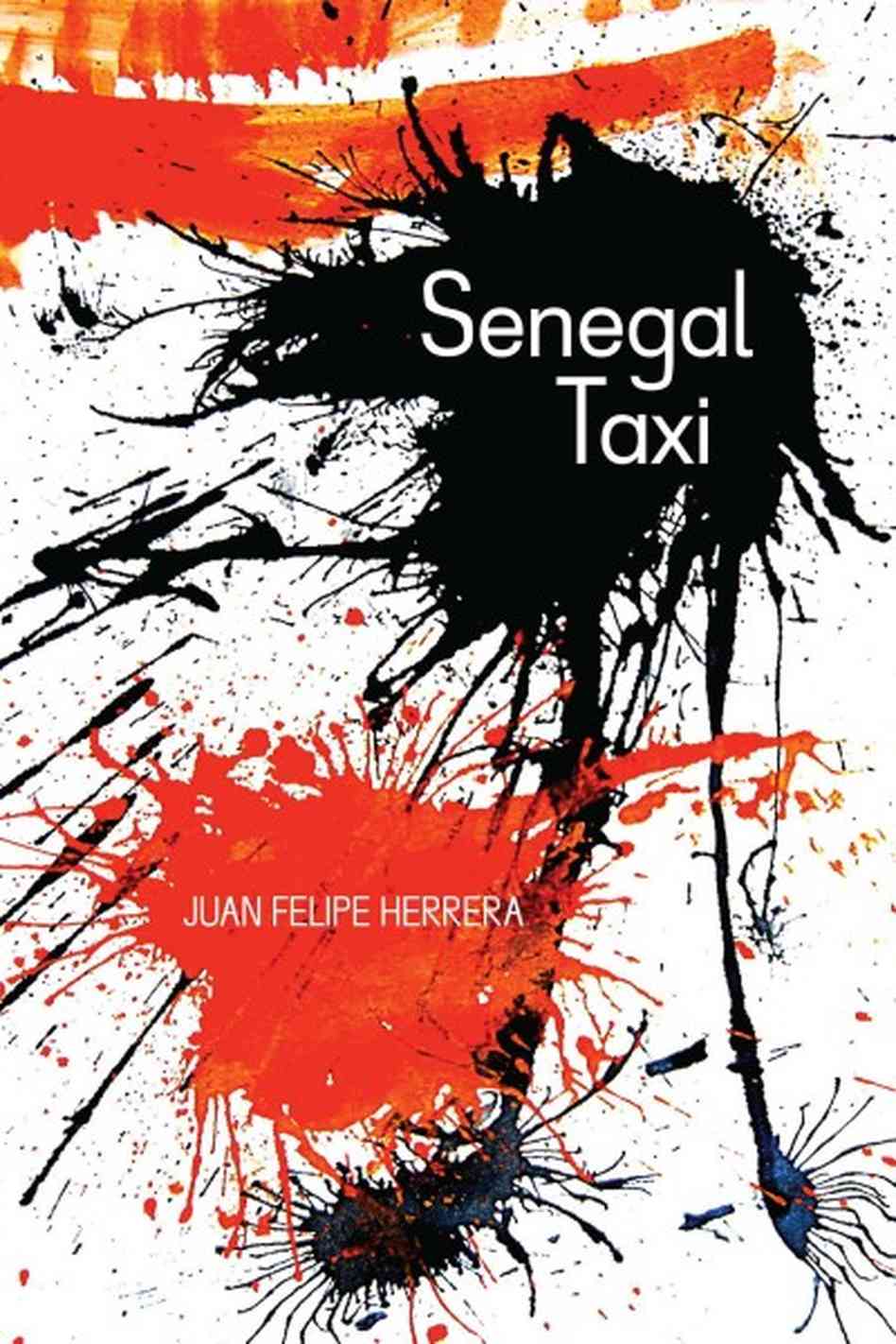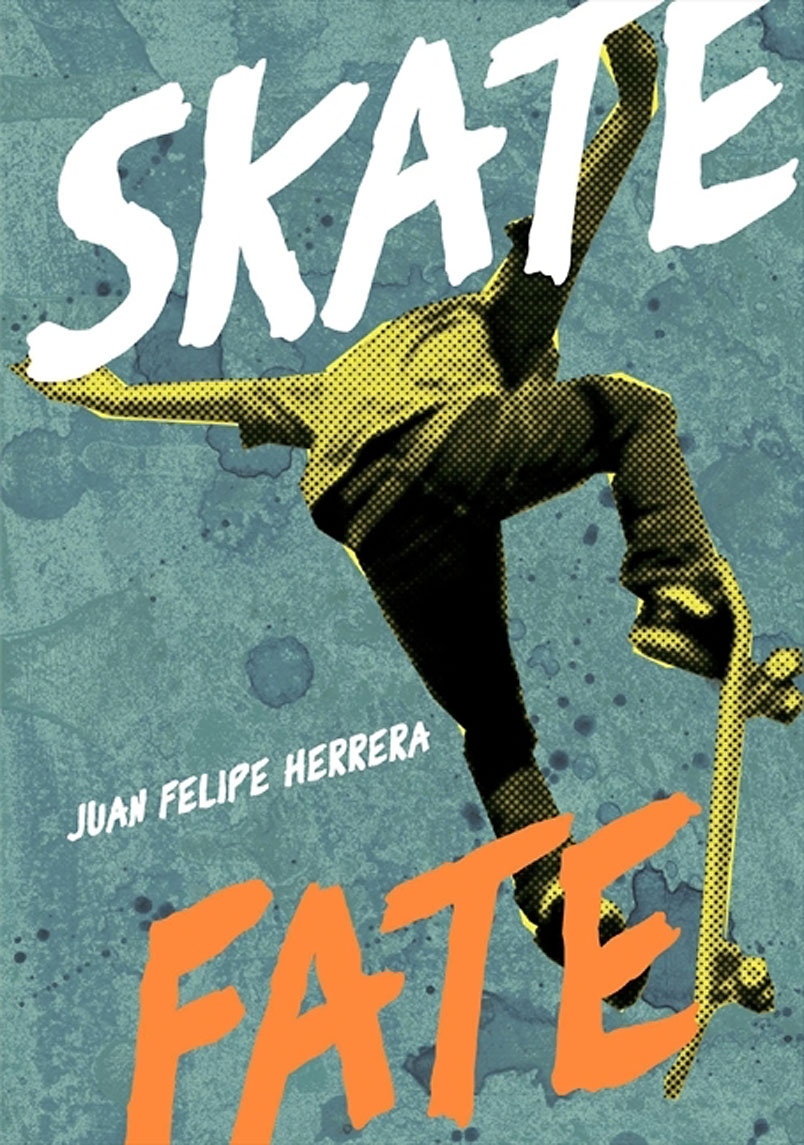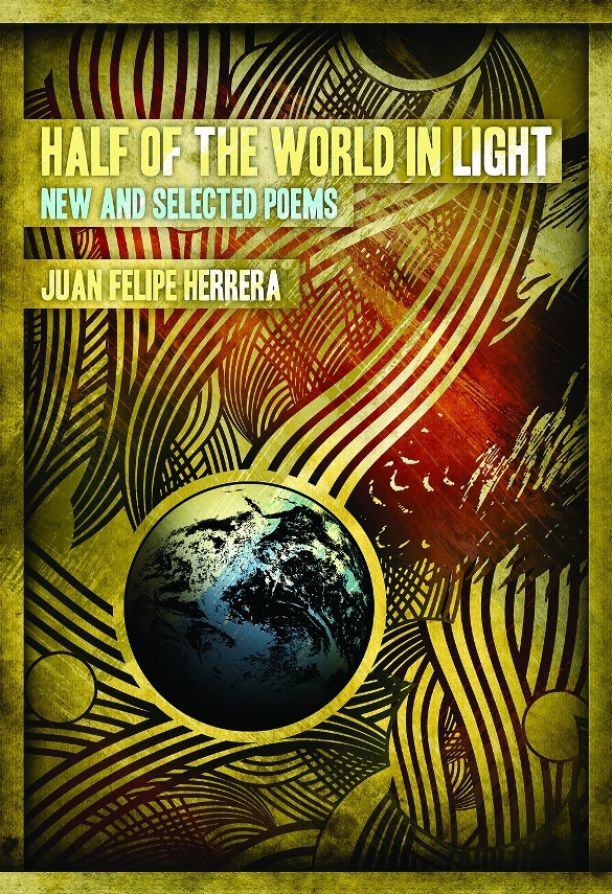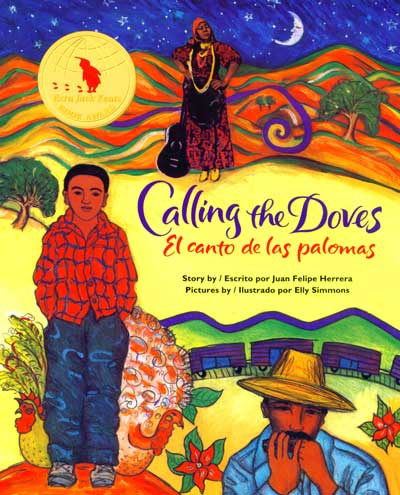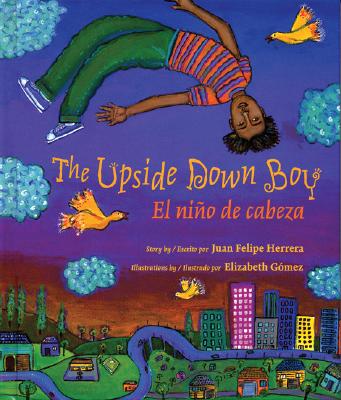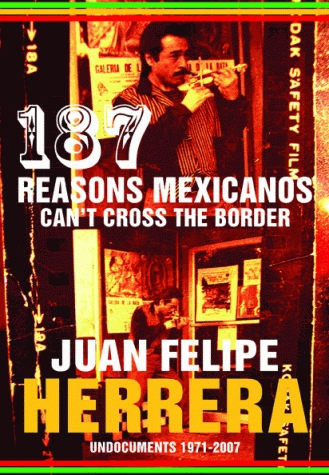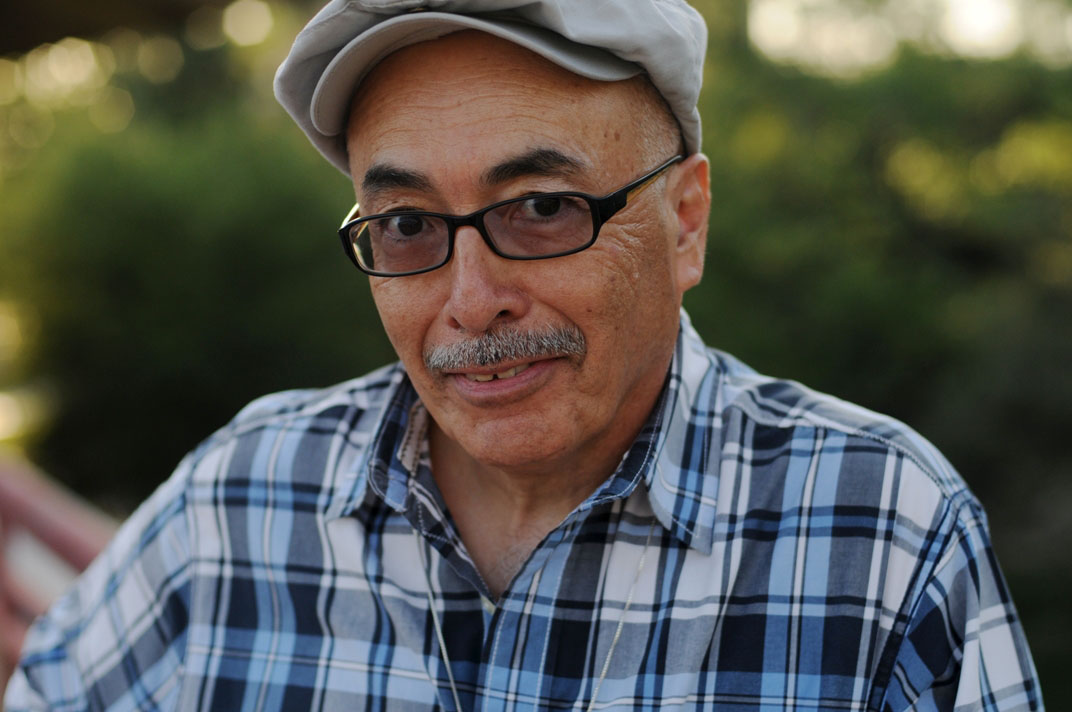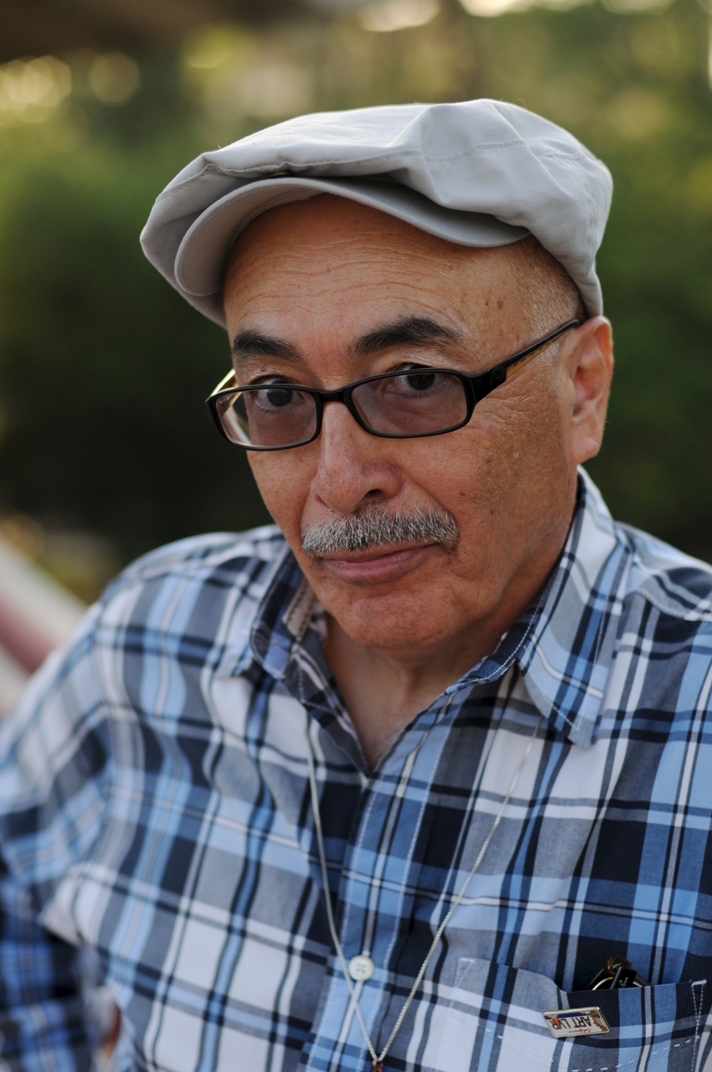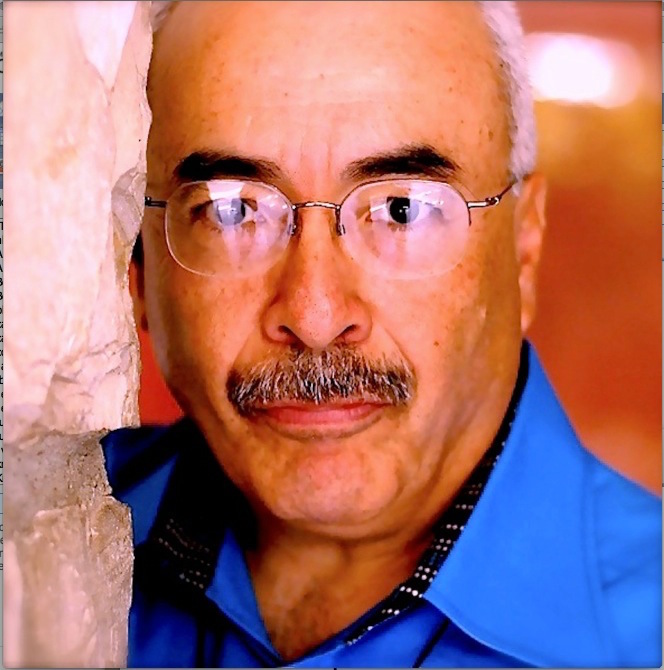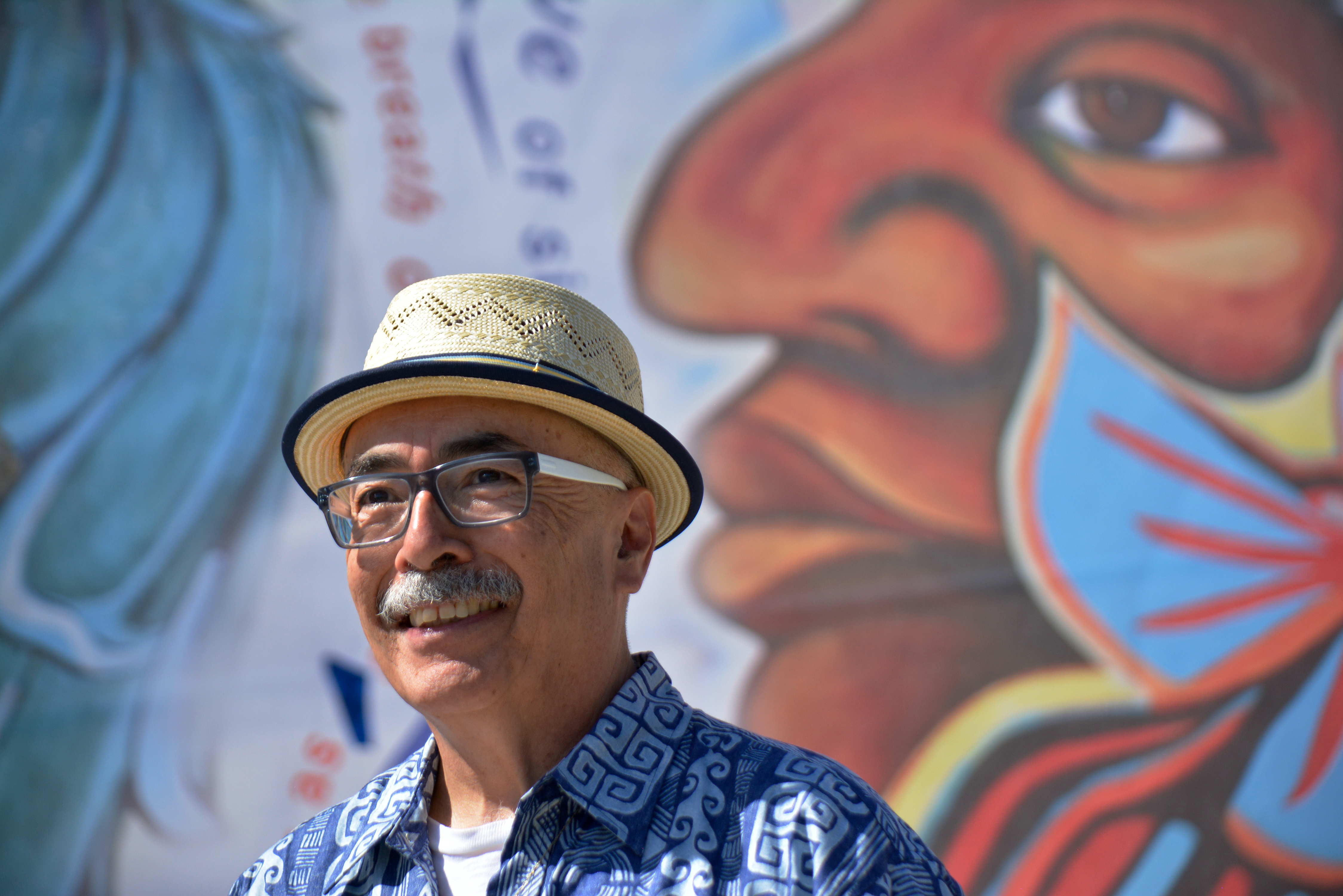
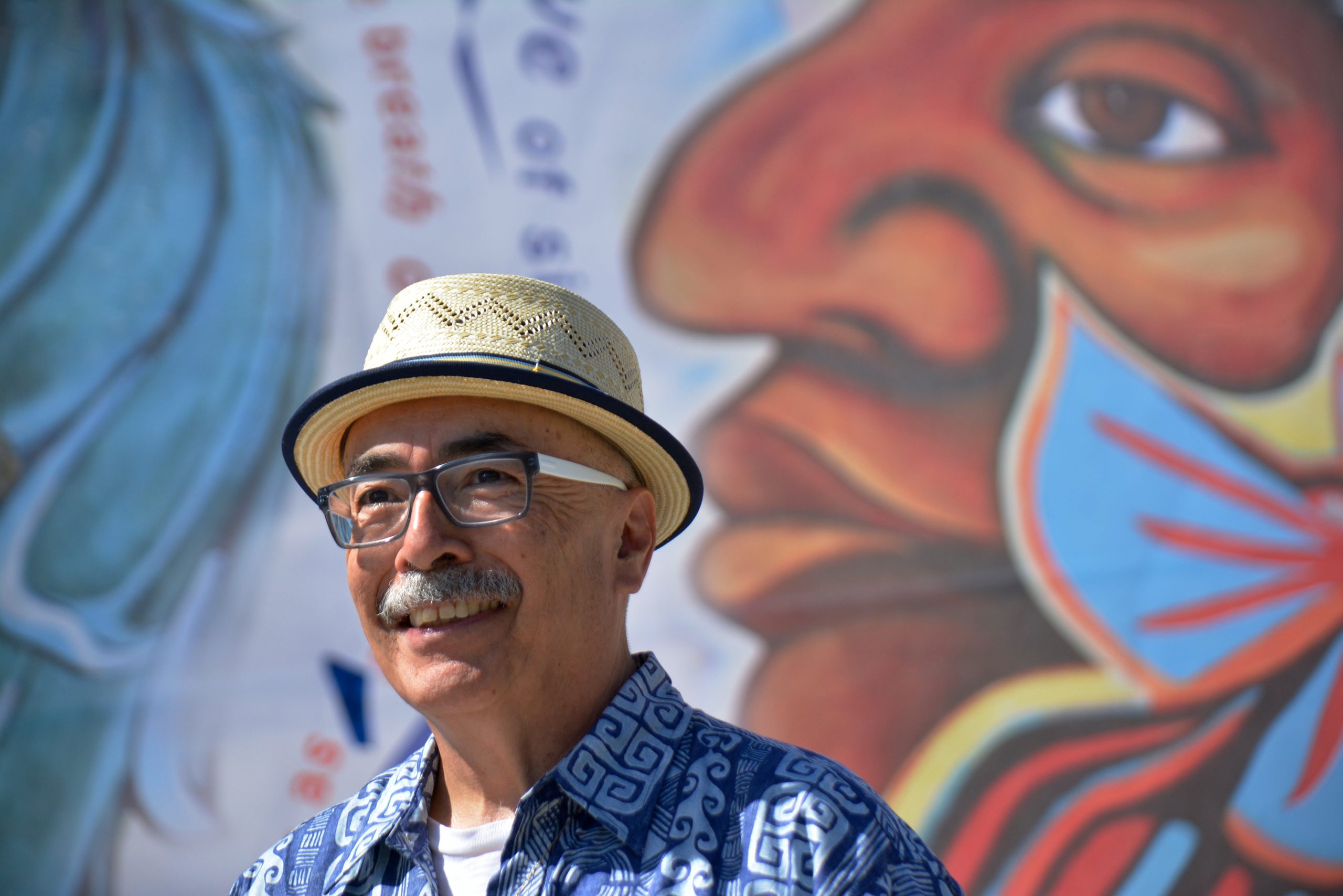
Juan Felipe Herrera
United States Poet Laureate (2015-2017)
Mexican American Performer & Activist
National Book Critic Circle Award Winner
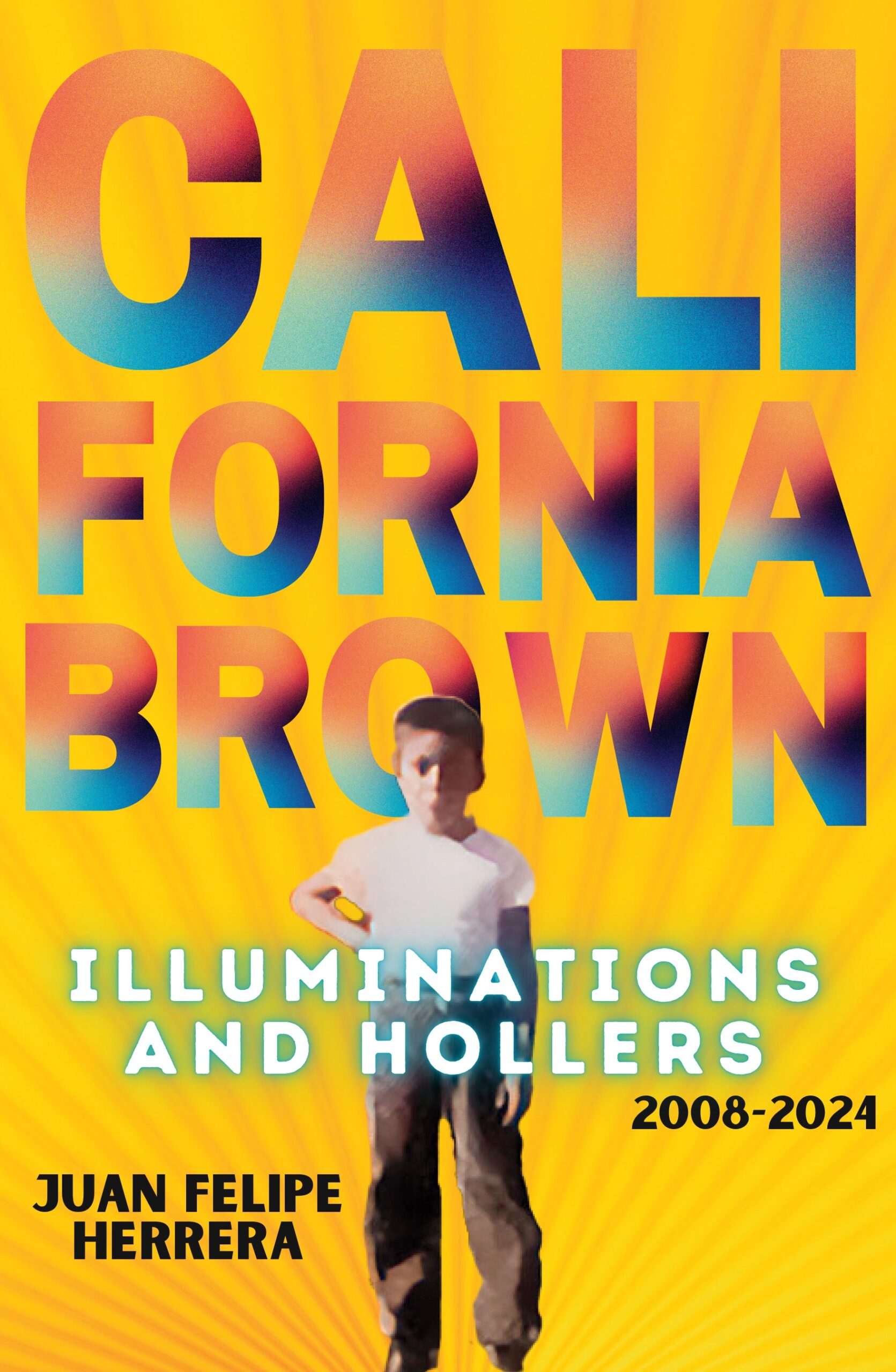

Readings &
Lecture Topics
- Latino and Chicano Poetry and Culture
- Immigration, Migration & the Alien Thing
- Rebuilding Writing and Culture in Schools
- Sharing Stories in Diverse Communities
- The Great 5th Grade Bully Project
- Surveillance, Violence, Creativity & Compassion
- Writing the World’s Impossible Fastest Poem
- From Scratch Paper to the Publisher
Biography
“The fire that appears again and again in Herrera’s poetry exists to illuminate, to make beautiful, to purify.” —New York Times Book Review
“Aesthetically, Herrera leaps over so many canons that he winds up on the outer limits of urban song. And spiritually, he is deep into the quest that we all must begin before it is too late.” —Ilan Stavans
“Waking up is the biggest thing. I’m a political poet — let us say a human poet, a poet that’s concerned with the plight of people who suffer. If words can be of assistance, then that’s what I’m going to use.” —Juan Felipe Herrera
In 2015 Juan Felipe Herrera was appointed the 21st United States Poet Laureate, the first Mexican American to hold the position. In his statement of choice, Librarian of Congress James H. Billington said Herrara’s poems “contain Whitman-esque multitudes that champion voices, traditions and histories, as well as a cultural perspective” that serve to illuminate our larger American identity. Herrera grew up in California as the son to migrant farmers, which he has commented strongly shaped much of his work. A Washington Post article tells the story that “As a child, Herrera learned to love poetry by singing about the Mexican Revolution with his mother, a migrant farmworker in California. Inspired by her spirit, he has spent his life crossing borders, erasing boundaries and expanding the American chorus.”
Herrera is the author of more than thirty books, including collections of poetry, prose, short stories, young adult novels and picture books for children. His collections of poetry include California Brown: Illuminations & Hollers (Mouthfeel Press, 2024), Every Day We Get More Illegal (City Lights, 2020), Notes of the Assemblage (City Lights, 2015), Senegal Taxi (University of Arizona, 2013); Half of the World in Light: New and Selected Poems (2008), a recipient of the PEN/Beyond Margins Award and the National Book Critics Circle Award; 187 Reasons Mexicanos Can’t Cross The Border: Undocuments 1971-2007 (City Lights, 2007); and Crashboomlove: A Novel in Verse (University of New Mexico, 1999), which received the Americas Award. In 2014, he released the nonfiction work Portraits of Hispanic American Heroes (Dial), which showcases twenty Hispanic and Latino American men and women who have made outstanding contributions to the arts, politics, science, humanitarianism, and athletics—a magnificent homage to those who have shaped our nation. His book Jabberwalking, a children’s book focused on turning your wonder at the world around you into weird, wild, incandescent poetry, came out in 2018.
The Boston Review wrote about Notes on the Assemblage, saying “U.S. Poet Laureate Juan Felipe Herrera appeals to Americans and artists. Herrera’s forceful poetry speaks directly and powerfully, like the address of a leader rousing his battalions to action…he forces us to confront society and its paradoxes. His summons links unadorned, unforgiving description with figurative language. Herrera also obliterates the passive relationship between a work of art and its observer. He is intimately concerned with what art does, ‘it follows you passes you dissolves ahead of you where / it is waiting for you when you get there you will not / know it until you see that it is seeing you seeing you.’ The stakes of this engagement for our communal body are viscerally felt: ‘we are not what we thought—it is / not who we were or / what we want to be.’”
His books of prose for children include: I Am the Future (Valley Children’s Press, 2024); Jabberwalking (Candlewick Press, 2018); SkateFate (Rayo, 2011); Calling The Doves (Children’s Book, 2001), which won the Ezra Jack Keats Award; Upside Down Boy (2006), which was adapted into a musical for young audiences in New York City; and Cinnamon Girl: Letters Found Inside a Cereal Box (HarperCollins, 2005), which tells the tragedy of 9/11 through the eyes of a young Puerto Rican girl.
From 2012-2014, Herrera served as California’s Poet Laureate, appointed by Governor Jerry Brown. As the state Poet Laureate, Herrera created the i-Promise Joanna Project, an anti-bullying poetry project. Joanna was an elementary school girl who was bullied and killed in an afterschool fight in Long Beach. The first half asks students to send in poems about experiences and effects of bullying. The second half of the project is to take action in preventing bullying. Herrera hopes to collect the poems and publish it as a book in the future. Other projects included Answer Cancer with a Poem, Show Me Your Papers, and The Most Incredible and Biggest Poem on Unity in the World.
Influenced by Allen Ginsberg and Luis Valdez and his own immersion into the Chicano Civil Rights Movement, Herrera writes passionately about social issues. His work has been known to cross genres, even into opera and dance theatre. While 187 Reasons Mexicanos Can’t Cross the Borders chronicles Herrera’s involvement with spoken word and street movement performance troupes across the nation, his attention to language-centered texts can be seen in Half of the World in Light. While calling Herrera “the elder statesman of Mexican American poetry,” former National Endowment for the Arts chairman Dana Gioia points to the significance of his connection to a younger generation. Herrera is, “the first U.S. laureate whose work has emerged from the new oral traditions that have been transforming American poetry over the past quarter-century,” Gioia says.
His poem, “Sunriders,” was included, bilingually, on a plaque inside the spacecraft on the Lucy mission. Blast off at Cape Canaveral, Florida in the fall of 202021, the plaque also includes words from the Beatles, Nobel Prize winners, and other Laureates.
Herrera has received fellowships and grants from the National Endowment for the Arts, the California Arts Council, the University of California at Berkeley, the Breadloaf Writers’ Conference, the Stanford Chicano Fellows Program, and a Guggenheim Fellowship. Recently, he received an International Book Award, the UC-Riverside Lifetime Achievement Award, and the Fred Cody Lifetime Achievement Award from the Sanfracisco Library. In 2016, he was awarded the Robert Kirsch Award for lifetime achievement at the 36th L.A. Times Book Prizes. Herrera was elected an Academy Chancellor in 2011. He was educated at UCLA and Stanford University in Social Anthropology, and received his MFA from the University of Iowa Writers’ Workshop. He has taught at the University of Iowa Writers’ Workshop and served as chair of the Chicano and Latin American Studies Department at CSU-Fresno. Herrera recently retired from the Creative Writing Department at UC Riverside. He lives in Fresno, California with his partner, the poet and performance artist, Margarita Robles.
Short Bio
Juan Felipe Herrera is the 21st Poet Laureate of the United States (2015-2016) and is the first Latino to hold the position. From 2012-2014, Herrera served as California State Poet Laureate. Herrera’s many collections of poetry include California Brown: Illuminations & Hollers; Every Day We Get More Illegal; Notes on the Assemblage; Senegal Taxi; Half of the World in Light: New and Selected Poems, a recipient of the PEN/Beyond Margins Award and the National Book Critics Circle Award; and 187 Reasons Mexicanos Can’t Cross The Border: Undocuments 1971-2007. He is also the author of Crashboomlove: A Novel in Verse, which received the Americas Award. His books of prose for children include: I Am the Future; SkateFate, Calling The Doves, which won the Ezra Jack Keats Award; Upside Down Boy, which was adapted into a musical for young audiences in New York City; and Cinnamon Girl: Letters Found Inside a Cereal Box. His book Jabberwalking, a children’s book focused on turning your wonder at the world around you into weird, wild, incandescent poetry, came out in 2018. Herrera is also a performance artist and activist on behalf of migrant and indigenous communities and at-risk youth.
Videos
Publications
California Brown: Illuminations & Hollers
Poetry, 2024
“Juan Felipe Herrera’s kaleidoscopic poetry collection takes the reader into unexpected territories, from the stark brutality to the delicate duality of life’s beauty”
Juan Felipe Herrera’s kaleidoscopic poetry collection takes the reader into unexpected territories, from the stark brutality of massacres and wars to the delicate duality of life’s beauty, where borders of nations and eras blur as Herrera guides us through the historical and geographical journey of humanity. Crossing into Poland from Ukraine becomes a metaphor for traversing the boundaries of culture, heritage, and shared history. Even William Shatner’s visionary experiences in the cosmos find a place within Herrera’s poetic narrative, connecting the boundless human spirit with the enigma of the cosmos.
“At its core, this collection vibrates a deep care, calling together cultural histories and ecological meditations while demanding remembrance for those lost to acts of violence committed directly and indirectly by the state. California Brown combines brilliance and compassion to forge a new future ahead, a gift from one of the most innovative poets of our time.” –Mai Der Vang, author of Yellow Rain
EVERY DAY WE GET MORE ILLEGAL
(Poetry, 2020)
“In ways subtle and sometimes proudly loud, this book makes it clear exactly why Juan Felipe Herrera continues to be recognized and sought after for his work. You hold in your hands evidence of who we really are.” —Jericho Brown
In this collection of poems, written during and immediately after two years on the road as United States Poet Laureate, Juan Felipe Herrera reports back on his travels through contemporary America. Poems written in the heat of witness, and later, in quiet moments of reflection, coalesce into an urgent, trenchant, and yet hope-filled portrait. The struggle and pain of those pushed to the edges, the shootings and assaults and injustices of our streets, the lethal border game that separates and divides, and then: a shift of register, a leap for peace and a view onto the possibility of unity. Every Day We Get More Illegal is a jolt to the conscience—filled with the multiple powers of the many voices and many textures of every day in America.
NOTES ON THE ASSEMBLAGE
(Poetry, 2015)
Juan Felipe Herrera, the first Latino Poet Laureate of the United States and son of Mexican immigrants, grew up in the migrant fields of California. Notes on the Assemblage brims with the exuberant vision and hard-won wisdom of a poet whose life and creative arc have spanned chasms of culture in an endless crossing, dreaming and back again.
JABBERWALKING
(Children’s Book, 2018)
Juan Felipe Herrera, the first Mexican-American Poet Laureate in the USA, is sharing secrets: how to turn your wonder at the world around you into weird, wild, incandescent poetry. Can you walk and talk at the same time? How about Jabberwalk? Can you write and draw and walk and journal all at the same time? If not, you’re in luck: exuberant, blue-cheesy cilantro man Juan Felipe Herrera, Poet Laureate of the United States, is here to teach you everything he knows about being a real-life, bonified, Jabberwalking poet! Jabberwalkers write and speak for themselves and others no matter where their feet may take them — to Jabberwalk is to be a poet on the move. And there’s no stopping once you’re a Jabberwalker, writing fast, fast, fast, scribble-poem-burbles-on-the-run. Scribble what you see! Scribble what you hear! It’s all out there — vámonos!
PORTRAITS OF HISPANIC AMERICAN HEROES
(Nonfiction, 2014)
This visually stunning book showcases twenty Hispanic and Latino American men and women who have made outstanding contributions to the arts, politics, science, humanitarianism, and athletics. Gorgeous portraits complement sparkling biographies of Cesar Chavez, Sonia Sotomayor, Ellen Ochoa, Roberto Clemente, and many more. Complete with timelines and famous quotes, this tome is a magnificent homage to those who have shaped our nation
CRASHBOOMLOVE: A NOVEL IN VERSE
(Poetry/Fiction, 1999)
In this novel in verse—unprecedented in Chicano literature—renowned poet Juan Felipe Herrera illuminates the soul of a generation. Drawn from his own life as well as a lifetime of dedication to young people, CrashBoomLove helps readers understand what it is to be a teen, a migrant worker, and a boy wanting to be a boy. Precise and profound, CrashBoomLove will appeal to and resonate with high school readers across the country.
SENEGAL TAXI
(Poetry, 2013)
“While reporters can give you the what, when, and where of a war, a poet with the enormous gifts of Juan Herrera can give you its soul. He does this by giving us the voices of both sides. The Janjaweed, who boast about their horrible deeds, and those who are their victims. Among them children with no father, no mother, no food, and no water.”—Ishmael Reed
“I wish I could find the words to tell you the story of our village after you were killed.” So begins Senegal Taxi, the new work by one of contemporary poetry’s most vibrant voices, Juan Felipe Herrera. Known for his activism and writings that bring attention to oppression and injustice, Herrera turns to stories of genocide and hope in Sudan. Senegal Taxi offers the voices of three children escaping the horrors of war in Africa. Unflinching in its honesty, brutality, and beauty, the collection fiercely addresses conflict and childhood, inviting readers to engage in complex and often challenging issues. Senegal Taxi weaves together verse, dialogue, and visual art created by Herrera specifically for the book. Stylistically genre-leaping, these many layers are part of the collection’s innovation. Phantom-like televisions, mud drawings, witness testimonies, insects, and weaponry are all storytellers that join the siblings for a theatrical crescendo. Each poem is told from a different point of view, which Herrera calls “mud drawings,” referring to the evocative symbols of hope the children create as they hide in a cave on their way to Senegal, where they plan to catch a boat to the United States. This collection signals a poignant shift for Herrera as he continues to use his craft to focus attention on global concerns. In so doing, he offers an acknowledgment that the suffering of some is the suffering of all.
SKATEFATE
(Young Adult Prose, 2011)
Lucky Z has always lived on the edge—he loved to skateboard, to drag race, to feel alive. But things have taken a turn—he’s living with new foster parents and a tragic past. An accident changed everything. And only his voice will set him free.
HALF OF THE WORLD IN LIGHT: NEW AND SELECTED POEMS
(Poetry, 2008)
For nearly four decades, Juan Felipe Herrera has documented his experience as a Chicano in the United States and Latin America through stunning, memorable poetry that is both personal and universal in its impact, themes, and approach. Often political, never fainthearted, his career has been marked by tremendous virtuosity and a unique sensibility for uncovering the unknown and the unexpected. Through a variety of stages and transformations, Herrera has evolved more than almost any other Chicano poet, always re-inventing himself into a more mature and seasoned voice. Now, in this unprecedented collection, we encounter the trajectory of this highly innovative and original writer, bringing the full scope of his singular vision into view. Beginning with early material from A Certain Man and moving through thirteen of his collections into new, previously unpublished work, this assemblage also includes an audio CD of the author reading twenty-four selected poems aloud. Serious scholars and readers alike will now have available to them a representative set of glimpses into his production as well as his origins and personal development. The ultimate value of bringing together such a collection, however, is that it will allow us to better understand and appreciate the complexity of what this major American poet is all about.
Articles & Audio
Read What’s In Print
• Children’s Books: Page Turners for Early Learners — Wall Street Journal
• How One Poet is Helping Chicago Students Find their Voice through Verse – PBS
• Poet Laureate on the Power of Poetry and Working with CPS – Chicago Tonight
• Juan Felipe Herrera on his dual immigrant, migrant identity —The San Diego Union-Tribune
• Review of Notes on the Assemblage — Boston Review
• New USPL Herrera Made a Fantastic Debut in DC — Washington Post
• Review of Notes on the Assemblage — Library Journal
• Juan Felipe Herrara Next Poet Laureate — New York Times
• Juan Felipe Herrara First Mexican American USPL — Washington Post
• US Poet Laureate: “The Audience is Half the Poem” — LA Times
• A Review of Two Books by Juan Felipe Herrera — New York Times
• Interview with Juan Felipe Herrera — Los Angeles Review of Books
• Profile on Juan Felipe Herrera — Dodge Poetry Festival
• Interview with Juan Felipe Herrera — Parent’s Choice
Listen to Audio
• Juan Felipe Herrera On Poetry In Tough Times – NPR Books
• US Poet Laureate Explores Positive Poetics with Tucson Students – Arizona Public Media
• The Sunday Edition with Michael Enright Interview — CBC Radio
• Herrera on Migrant Farmworkers, the Border, and Ayotzinapa — Democracy Now
• USPL’s Migrant Childhood Like ‘Living in Literature Every Day’ — NPR Morning Edition
• Juan Felipe Herrera first Latino US Poet Laureate – PBS NewsHour
• On Being Named US Poet Laureate — NPR
• Guest DJ: California Poet Laureate Juan Felipe Herrera — NPR
• US Poet Laureate Juan Felipe Herrera’s Second Term To Focus On Youth, Fresno – NPR
Selected Writings
I Am Merely Posing for a Photograph
I am merely posing for a photograph.
Remember, when the Nomenclature
stops you, tell them that—“Sirs, he was posing
for my camera, that is all.” . . . yes, that may just work.
My eyes:
clear, hazel like my father’s, gaze across the sea, my hands at my side, my
legs spread apart in the wet sands, my pants crumpled, torn, withered, my
shirt in rags, see-through in places, no buttons, what a luxury, buttons, I
laugh a little, my tongue slips and licks itself, almost, I laugh, licks itself
from side to side, the corners of my mouth, if only I could talk like I used
to, giggle under moonlight, to myself, my arms destitute, shrunken, I
hadn’t noticed, after so many years sifting through rubble stars, rubble toys,
rubble crosses, after so many decades beseeching rubble breasts—pretend I
came to swim, I am here by accident,
like you.
My face to one side.
Listen to gray-white bells of rubble, the list
goes on—the bones, hearts, puffed intestines,
stoned genitalia, teeth, again I forget how
to piece all this together, scraps, so many scraps,
lines and holes.
The white gray rubble light blinds me,
wait, I just thought—what if this is not visible,
what if all this is not visible.
Listen here, closely:
I am speaking of the amber thighs
still spilling nectar on the dust fleece across Gaza,
the mountains, the spliced wombs across Israel, Syria.
The amber serums cut across all boundaries,
they smell incense, bread, honey—the color
of my mother’s hands, her flesh, the shrapnel is the same color
the propellers churn.
– from Half of the World in Light: New and Selected Poems

